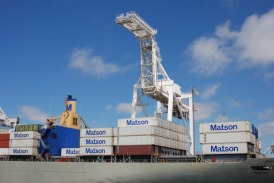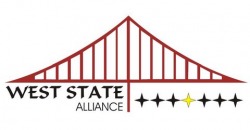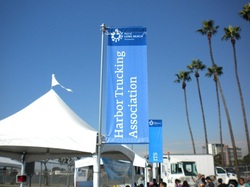Oakland Terminal Operator's & Shiplines are in Violation of SB45
CALIFORNIA CODES BUSINESS AND PROFESSIONS CODE SECTION 22928
(a) The Legislature finds and declares that unilateral termination, suspension, or restriction of equipment interchange rights of an intermodal motor carrier shall not result from intermodal marine terminal actions as specified in subdivision (b).
(b) An intermodal marine equipment provider or intermodal marine terminal operator shall not impose per diem, detention, or demurrage charges on an intermodal motor carrier relative to transactions involving cargo shipped by intermodal transport under any of the following circumstances:
(1) When the intermodal marine or terminal truck gate is closed during posted normal working hours. No per diem, detention, or demurrage charges shall be imposed on a weekend or holiday, or during a labor disruption period, or during any other period involving an act of God or any other planned or unplanned action that closes the truck gate.
(2) When the intermodal marine terminal decides to divert equipment without 48 hours' electronic or written notification to the motor carrier.
(3) When the intermodal marine terminal is assessed a fine pursuant to Section 40720 of the Health and Safety Code.
(4) When the intermodal marine terminal equipment is out of compliance pursuant to Section 34505.9 of the Vehicle Code or the equipment is placed out of service.
(5) When a loaded container is not available for pickup when the motor carrier arrives at the intermodal marine terminal.
(6) When the intermodal marine terminal is too congested to accept the container and turns away the motor carrier.
(c) An intermodal marine equipment provider shall not take any of the following actions:
(1) Charge back, deduct, or offset per diem charges, maintenance and repair charges, or peak hour pricing from a motor carrier's freight bill.
(2) Unilaterally terminate, suspend, or restrict the equipment interchange rights of a motor carrier or driver that uses the dispute resolution process contained in the Uniform Intermodal Interchange and Facilities Access Agreement to contest a charge, fee, or fine, including a charge for maintenance and repairs imposed by the intermodal marine terminal, while the dispute resolution process is ongoing.
(3) Unilaterally terminate, suspend, or restrict the equipment interchange rights of a motor carrier for late payment of an undisputed invoice from the intermodal marine terminal, provided that the payment is no more than 60 days late.
(4) Unilaterally terminate, suspend, or restrict the equipment interchange rights of a motor carrier or driver for parking tickets issued by the marine terminal unless the tickets remain unpaid more than 60 days after being in receipt of the driver or motor carrier. No parking tickets shall be issued by the marine terminal to a driver or motor carrier for a parking violation if the assigned spot was occupied and the trouble window or terminal administration was unable to immediately provide a place to park, or if the driver was instructed to park the equipment in a different spot by marine terminal personnel or security.
(5) Willfully attempt to circumvent any provisions of this section or to fail, for any reason other than what is specified in the governing port tariff, to collect demurrage when due and payable and when consistent with this section. An intermodal motor carrier shall not be liable for any portion of demurrage when an intermodal container is not picked up during free time, which is the time period before demurrage charges are to be applied.
(d) As used in this chapter:
(1) "Per diem," "detention," or "demurrage" means a charge imposed by an equipment provider or marine terminal operator for late return or pickup of an empty or a loaded intermodal container and chassis.
(2) "Closed" means not open or available to receive equipment. The marine terminal shall have posted working hours, and "closed" shall mean that the terminal is not open to release or accept equipment during those posted working hours.
(3) "Divert equipment" means the motor carrier has been directed to return the equipment to a location different from the location where the equipment was picked up by the motor carrier.
(4) "Shall not impose per diem, detention, or demurrage charges on an intermodal carrier" shall apply to the day or days in question that an occurrence referenced in subdivision (b) took place.
(5) "Intermodal marine terminal" means a marine terminal location or facility that engages in discharging or receiving equipment owned, operated, or controlled by an equipment provider.
(6) "Written or electronic notification" means any communication by postal letter, facsimile, electronic mail, or other electronic notification.
Senate Bill No. 45, CHAPTER 244, An act to add Chapter 28.5 (commencing with Section 22928) to Division 8 of the Business and Professions Code
(a) The Legislature finds and declares that unilateral termination, suspension, or restriction of equipment interchange rights of an intermodal motor carrier shall not result from intermodal marine terminal actions as specified in subdivision (b).
(b) An intermodal marine equipment provider or intermodal marine terminal operator shall not impose per diem, detention, or demurrage charges on an intermodal motor carrier relative to transactions involving cargo shipped by intermodal transport under any of the following circumstances:
(1) When the intermodal marine or terminal truck gate is closed during posted normal working hours. No per diem, detention, or demurrage charges shall be imposed on a weekend or holiday, or during a labor disruption period, or during any other period involving an act of God or any other planned or unplanned action that closes the truck gate.
(2) When the intermodal marine terminal decides to divert equipment without 48 hours' electronic or written notification to the motor carrier.
(3) When the intermodal marine terminal is assessed a fine pursuant to Section 40720 of the Health and Safety Code.
(4) When the intermodal marine terminal equipment is out of compliance pursuant to Section 34505.9 of the Vehicle Code or the equipment is placed out of service.
(5) When a loaded container is not available for pickup when the motor carrier arrives at the intermodal marine terminal.
(6) When the intermodal marine terminal is too congested to accept the container and turns away the motor carrier.
(c) An intermodal marine equipment provider shall not take any of the following actions:
(1) Charge back, deduct, or offset per diem charges, maintenance and repair charges, or peak hour pricing from a motor carrier's freight bill.
(2) Unilaterally terminate, suspend, or restrict the equipment interchange rights of a motor carrier or driver that uses the dispute resolution process contained in the Uniform Intermodal Interchange and Facilities Access Agreement to contest a charge, fee, or fine, including a charge for maintenance and repairs imposed by the intermodal marine terminal, while the dispute resolution process is ongoing.
(3) Unilaterally terminate, suspend, or restrict the equipment interchange rights of a motor carrier for late payment of an undisputed invoice from the intermodal marine terminal, provided that the payment is no more than 60 days late.
(4) Unilaterally terminate, suspend, or restrict the equipment interchange rights of a motor carrier or driver for parking tickets issued by the marine terminal unless the tickets remain unpaid more than 60 days after being in receipt of the driver or motor carrier. No parking tickets shall be issued by the marine terminal to a driver or motor carrier for a parking violation if the assigned spot was occupied and the trouble window or terminal administration was unable to immediately provide a place to park, or if the driver was instructed to park the equipment in a different spot by marine terminal personnel or security.
(5) Willfully attempt to circumvent any provisions of this section or to fail, for any reason other than what is specified in the governing port tariff, to collect demurrage when due and payable and when consistent with this section. An intermodal motor carrier shall not be liable for any portion of demurrage when an intermodal container is not picked up during free time, which is the time period before demurrage charges are to be applied.
(d) As used in this chapter:
(1) "Per diem," "detention," or "demurrage" means a charge imposed by an equipment provider or marine terminal operator for late return or pickup of an empty or a loaded intermodal container and chassis.
(2) "Closed" means not open or available to receive equipment. The marine terminal shall have posted working hours, and "closed" shall mean that the terminal is not open to release or accept equipment during those posted working hours.
(3) "Divert equipment" means the motor carrier has been directed to return the equipment to a location different from the location where the equipment was picked up by the motor carrier.
(4) "Shall not impose per diem, detention, or demurrage charges on an intermodal carrier" shall apply to the day or days in question that an occurrence referenced in subdivision (b) took place.
(5) "Intermodal marine terminal" means a marine terminal location or facility that engages in discharging or receiving equipment owned, operated, or controlled by an equipment provider.
(6) "Written or electronic notification" means any communication by postal letter, facsimile, electronic mail, or other electronic notification.
Senate Bill No. 45, CHAPTER 244, An act to add Chapter 28.5 (commencing with Section 22928) to Division 8 of the Business and Professions Code
Study of Port of Oakland Truck Emissions Reported at Hearing
Recently, EETD’s Thomas Kirchstetter, and Tim Dallman and Robert Harley of the University of California, Berkeley, presented the results of a study on the emissions of PM (particulate matter) and NOx (nitrogen oxides) from trucks at the Port of Oakland. The occasion was an August 4th hearing in Oakland, California, convened by Alameda County supervisors to discuss requirements that trucks accessing the Port reduce the pollution they emit.
Communities near ports, rail yards and trucking hubs experience a disproportionately high level of PM emissions. These emissions are suspected to have human health impacts.
....click on the link above to read more.
|
|
Are you an Oakland Trucker?
.......this is the group for you! |
Port of Oakland

Port of Oakland
The Port of Oakland headquarters is located at 530 Water Street, Oakland, California 94607. The Port of Oakland occupies 19 miles of waterfront on the eastern shore of San Francisco Bay, with about 900 acres devoted to maritime activities and another 2,600 acres devoted to aviation activities.
West State Alliance

West State Alliance
West State Alliance represents the best interests of independent truckers, the trucking industry and the communities we serve by promoting the highest standards for safe, efficient and environmentally conscious container-load transportation. WSA strives to be the most productive and positive force in the West Coast trucking industry with a goal of achieving "cleanest and greenest" conditions for neighboring communities.
As a trucking trade association, we promote legislative, regulatory and economic priorities favorable to small business and the transportation industry. Likewise, as a membership organization, we strive to ensure conditions that support fair and equitable treatment of independent truckers. We are the voice of the Port of Oakland trucker.
WSA was founded as a nonprofit trade association in 2004 by a dedicated group of independent trucking companies (Primary Motor Carriers) serving the Port of Oakland. These Charter Members envisioned an organization serving the best interests and addressing the most pressing needs of local truckers. They felt an independent organization could unify truckers around industry priorities by articulating common interests, promoting best practices and providing the means to speak with a collective and authoritative voice.
From its inception, WSA has pursued its mission by conducting the following activities:
As a trucking trade association, we promote legislative, regulatory and economic priorities favorable to small business and the transportation industry. Likewise, as a membership organization, we strive to ensure conditions that support fair and equitable treatment of independent truckers. We are the voice of the Port of Oakland trucker.
WSA was founded as a nonprofit trade association in 2004 by a dedicated group of independent trucking companies (Primary Motor Carriers) serving the Port of Oakland. These Charter Members envisioned an organization serving the best interests and addressing the most pressing needs of local truckers. They felt an independent organization could unify truckers around industry priorities by articulating common interests, promoting best practices and providing the means to speak with a collective and authoritative voice.
From its inception, WSA has pursued its mission by conducting the following activities:
- discussed and negotiated with steamship companies on business issues of common concern to West Coast independent trucking companies;
- coordinated and engaged in litigation of business disputes of common concern;
- held meetings with members who are involved in West Coast independent trucking to discuss new developments and opportunities;
- presented information and opinions to government agencies;
- attempted to influence legislation germane to the members' common business interests;
- promoted improved business standards and methods and uniform business practices; and
- held conferences, seminars and meetings for the purpose of discussing the problems of the industry.
Harbor Trucking Association

"We are the only organization dedicated to representing the harbor trucking community in the Long Beach/Los Angeles region."
Mission Statement
"Harbor Trucking Association is a coalition of Los Angles and Long Beach intermodal carriers who's purpose is to advocate, educate and promote strategies with other goods movement stakeholders and policy makers that will sustain emission reductions, provide a dialog for intermodal truck efficiency, and to return cargo and jobs to Southern California ports."
The West Oakland Environmental Indicators Project - WOEIP

The West Oakland Environmental Indicators Project is a
resident led, community-based environmental justice organization dedicated to
achieving healthy homes, healthy jobs and healthy neighborhoods for all who
live, work, learn and play in West Oakland, California. Through our
Community-Based Participatory Research projects and our Collaborative
Problem-Solving Model we build community empowerment and help local residents to
achieve their own vision for healthy neighborhoods.